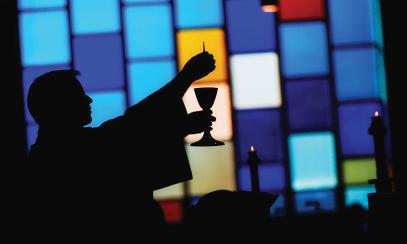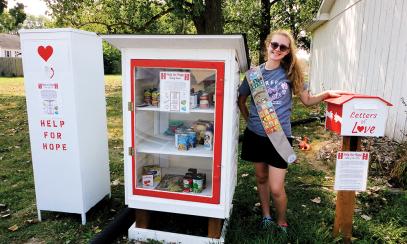
Spotlight on Mystics
Bob Burnham, a parishioner at Resurrection Parish in Wayne, recently wrote a book called Little Lessons from the Mystics: 52 Simple and Surprising Ways to Experience the Mysteries of Faith. Carlos Briceño asked him some questions about the book, in general, and about mystics, in particular.
What compelled you to write a book on mystics?
Bob Burnham: In our imagination, mystics are people from a bygone age. They're from the Middle Ages. They might have lived in monasteries or in isolated wilderness. We don't see them today, or as much. Many may seem irrelevant or unapproachable. Julian of Norwich [a 14th-century English mystic] was a good example. She was someone who was literally unapproachable. She was an anchorite [someone who, for religious reasons, withdraws from society to lead an intensely prayer-oriented and ascetic life]. They just seem so distant and so far removed from our lives in the 21st-century United States. As I was writing the book, what really compelled me to write it was that I wanted to make mystics seem relevant to us today.
What’s a definition of a mystic?
Burnham: The formal definition of a mystic is someone has experienced union with the Divine. That union might be manifested in a visible sign, like the stigmata, or it might have been a revelation that was shared and recorded. People who were experiencing divine union might have some ecstatic experience, like levitating or bilocating. When I began writing this book, I began with that basic definition. But, the more I worked on it, I began to think of mysticism differently. To me, a mystic is simply someone who lives the mysteries of the faith. That’s a more approachable definition. I can do something with that. I can’t levitate, but I can figure out how I can live the mysteries of our faith in my own unique way.
For example, we have the mystery of the Incarnation. A mystic really tries to live out what that mystery means by living in a way that shows that God is near us; that mystic’s heart is transformed by God’s nearness. A mystic is someone who just doesn’t believe that Jesus Christ is truly present, Body and Blood, under the appearance of bread and wine, but is transformed by that encounter to be Eucharist to others. This understanding reflects my Franciscan background. I’m a Secular Franciscan, and the Eucharist plays such a central part in our spirituality. And for me it's all about that conversion, that transformation. How do the mysteries of our faith transform us to be more loving, compassionate, and merciful people?
How did writing this book affect your faith life?
Burnham: It reinforced something that I always believed: that everything in the universe is a sacred encounter with God. That’s easy if I’m talking about Scripture and the sacraments—those are obviously sacred encounters. I have no problem seeing the natural world as a sacred encounter. I love bird watching, right? When I watch birds do what birds do, when I look at beauty in their plumage, when I hear them sing so carefree, I feel a level a peace that tells me that God is present. But seeing human beings as a sacred encounter? Wow, that’s hard. This book really took me to task on that. Do I see Christ in other people? Do I act toward them in the same way I imagine I would act toward Christ? I actually made the mistake of answering that question honestly, and I was not happy with my answer. Truth is, I don’t. I don’t even think I want to.
But I want to want to. That’s a key change in my perspective. What would I have to do to follow up on that desire? That’s not hard to answer if it’s someone I like, someone who prays like me, looks like me, or votes like me. But when it’s someone who’s different, wow, that’s hard. I’d much rather turn them into villains. But the faith-filled response, I think, is to not turn other people into villains. I can’t assume the worst in people. I want to do the opposite. I want to learn how to see them as friends, as brothers, as sisters. I have to give people the benefit of the doubt. Only then can I possibly see myself be an agent of God’s grace.
This approach has helped me break the vicious cycle of anger and hate that leads to division. Instead of seeing every difference I have with someone over this or that issue as a mortal combat to the death, instead of asking how I can win an argument, I now ask myself, “How can I grow in relationship with this person?” Honestly, that’s not just a faith-filled way of being, it’s a healthier way too.
What is the biggest lesson you hope people get from reading the book?
Burnham: I hope that people start looking for God in places where they wouldn't otherwise, or even in places where they would think it was impossible. Too often we want to limit our search for God to certain places. I can only find God in going to church, or I can only find God in Scripture. Those are great places to find God, and I look for God there all the time.
I also know that God is bigger than all of that; God is bigger than everything. Because God made everything, everything reflects God. That’s a key insight of the Franciscan tradition, I think. The great Jesuit spiritual writer, William Barry, once wrote that if we can find God anywhere, and we can, then we can find God everywhere. And that's what I want people to get out of this book: Faith is not just giving intellectual assent to a particular set of beliefs. Faith is a way of being that reflects Jesus Christ. Being a faithful Catholic is not simply knowing the Catechism. Being a faithful Catholic means that people have a hard time telling us apart from Jesus. That requires a fundamental change in how we see and interact with the world, with others, and, frankly, with ourselves. Everything else flows from that. That fundamental change is to see the world – everything in the world – through the eyes of love.



